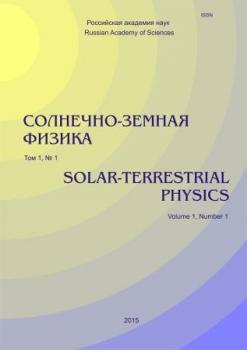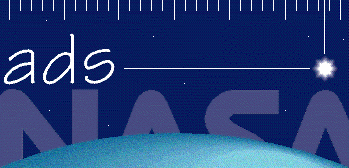Noginsk, Moscow, Russian Federation
Samara National Research University
Moscow, Russian Federation
UDC 55
We have used data from the space telescope SOHO/EIT and the spectrometer VEIS on the Wind spacecraft to compare the solar wind (SW) speed near Earth's orbit with changes in the area of polar coronal holes (CHs) on the Sun during the 1996 solar activity minimum. We have found that in March 1996 the SW speed correlated with the southern CH area by a factor of 0.64. In September and October 1996, a correlation was revealed between the SW speed and the area of the northern CH (the coefficients are 0.64 and 0.85 respectively). We believe that this confirms the assumption that the solar wind from polar CHs can penetrate into the ecliptic plane at solar minimum. The SW speed was 460–500 km/s, which is lower than that from equatorial CHs (600–700 km/s).
coronal holes, solar wind, solar cycle
1. Ahtemov Z.S., Cap Yu.T. O zavisimosti magnitnogo polya nizkoshirotnoy koronal'noy dyry ot ee ploschadi. Pis'ma v Astronomicheskiy zhurnal. 2021. T. 47, № 2. S. 138-144. DOI:https://doi.org/10.31857/S0320010821010010.
2. Baker K.B., Papagiannis M.D. Correlation of high latitude coronal holes with solar wind streams far above or below the ecliptic. Solar Phys. 1982, vol. 78, pp. 365-372. DOI:https://doi.org/10.1007/BF00151616.
3. Bogachev S.A., Reva A.A., Kirichenko A.S., Ulyanov A.S., Loboda I.P. Influence of Active Regions on Solar Wind Characteristics at the Cycle Maximum. Astronomy Lett. 2022, vol. 48, no. 7, pp. 406-415. DOI:https://doi.org/10.1134/S1063773722070039.
4. Borisenko A.V., Bogachev S.A. Influence of Polar Coronal Holes on Solar Wind Characteristics at the Activity Minimum between Solar Cycles 24 and 25. Astronomy Lett. 2020, vol. 46, no. 11, pp. 751-761. DOI:https://doi.org/10.1134/S1063773720110018.
5. Chashei I.V., Lebedeva T.O., Tyul’bashev S.A., Subaev I.A. Corotating and propagating disturbances in the solar wind based on monitoring of interplanetary scintillations at the LPA radio telescope of the Lebedev Physical Institute in 2017. Astronomy Rep. 2020, vol. 64, pp. 66-81. DOI: 10.1134/ S1063772920010084.
6. Chashei I.V., Tyul’bashev S.A., Subaev I.A. Solar Wind from Maximum to Minimum for Cycle 24 in Interplanetary Scintillation Monitoring Data. Astronomy Rep. 2022, vol. 66, no. 1, pp. 42-47. DOI:https://doi.org/10.1134/S1063772922010036.
7. Hofmeister S.J., Veronig A.M., Poedts S., Samara E., Magdalenic J. On the dependency between the peak velocity of high-speed solar wind streams near earth and the area of their solar source coronal holes. Astrophys. J. Lett. 2020, vol. 897, no. 1, p. L17. DOI:https://doi.org/10.3847/2041-8213/ab9d19.
8. Kirov B., Asenovski S., Georgieva K., Obridko V.N. What causes geomagnetic activity during sunspot minimum? Geomagnetism and Aeronomy. 2015, vol. 55, pp. 1033-1038. DOI:https://doi.org/10.1134/S0016793215080149.
9. Ko Y.-K., Fisk L.A., Geiss J., Gloeckler G., Guhathakurta M. An empirical study of the electron temperature and heavy ion velocities in the south polar coronal hole. Solar Phys. 1997, vol. 171, no. 2, pp. 345-361. DOI:https://doi.org/10.1023/A:1004943213433.
10. Krieger A.S., Timothy A.F., Roelof E.C. A coronal hole and its identification as the source of a high velocity solar wind stream. Solar Phys. 1973, vol. 29, pp. 505-525. DOI:https://doi.org/10.1007/BF00150828.
11. Macneil A.R., Owen C.J., Baker D., Brooks D.H., Harra L.K., Long D.M., Wicks R.T. Active region modulation of coronal hole solar wind. Astrophys. J. 2019, vol. 887, no. 2, p. 146. DOI:https://doi.org/10.3847/1538-4357/ab5586.
12. McComas D.J., Riley P., Gosling J.T., Balogh A., Forsyth R. Ulysses’ rapid crossing of the polar coronal hole boundary. J. Geophys. Res.: Space Phys. 1998, vol. 103, no. A2, pp. 1955-1967. DOI:https://doi.org/10.1029/97JA01459.
13. Munro R.H., Jackson B.V. Physical properties of a polar coronal hole from 2 to 5 R sun. Astrophys. J. 1977, vol. 213, rp. 874-886. DOI:https://doi.org/10.1086/155220.
14. Neugebauer M., Goldstein B.E., McComas D.J., Suess S.T., Balogh A. Ulysses observations of microstreams in the solar wind from coronal holes. J. Geophys. Res.: Space Phys. 1995, vol. 100, iss. A12, pp. 23389-23395. DOI:https://doi.org/10.1029/95JA02723.
15. Nolte J.T., Krieger A.S., Timothy A., Gold R.E., Roelof E.C., Vaiana G., Lazarus A.J.,. Sullivan J.D., McIntosh P.S. Coronal holes as sources of solar wind. Solar Phys. 1976, vol. 46, pp. 303-322. DOI:https://doi.org/10.1007/BF00149859.
16. Prosovetsky D.V., Myagkova I.N. The correlation between geomagnetic disturbances and topology of quasi-open structures in the solar magnetic field. Geomagnetism and Aeronomy. 2011, vol. 51, pp. 1078-1082. DOI:https://doi.org/10.1134/S0016793211080342.
17. Reiss M.A., Muglach K., Möstl C., Arge C.N., Bailey R., Delouille V., Garton T.M., Hamada A., Hofmeister S.,, Illarionov E.. The Observational Uncertainty of Coronal Hole Boundaries in Automated Detection Schemes. Astrophys. J. 2021, vol. 913, pp. 28-36. DOI:https://doi.org/10.3847/1538-4357/abf2c8.
18. Rotter T., Veronig A.M., Temmer M., Vršnak B. Relation between coronal hole areas on the Sun and the solar wind parameters at 1 AU. Solar Phys. 2012, vol. 281, pp. 793-813. DOI:https://doi.org/10.1007/s11207-012-0101-y.
19. Sime D. G., Rickett B. J. The latitude and longitude structure of the solar wind speed from IPS observations. J. Geophys. Res.: Space Phys. 1978, vol. 83, no. A12, pp. 5757-5762. DOI:https://doi.org/10.1029/JA083iA12p05757.
20. Stansby D., Green L.M., van Driel-Gesztelyi L. Active region contributions to the solar wind over multiple solar cycles. Solar Phys. 2021, vol. 296, no. 8, p. 116. DOI:https://doi.org/10.1007/s11207-021-01861-x.
21. Waldmeier M. Analyse einer koronalen Kondensation. Mit 3 Textabbildungen. Zeitschrift fur Astrophysik. 1956, vol. 40, pp. 221-235.
22. Wang Y.M., Sheeley Jr N.R. Solar wind speed and coronal flux-tube expansion. Astrophys. J. 1990, vol. 355, rp. 726-732.
23. URL: https://rscf.ru/project/23-72-30002/ (accessed April 15, 2023).
24. Akhtemov Z.S., Tsap Y.T. On the Relationship between the Magnetic Field of a Low-Latitude Coronal Hole and Its Area. Astronomy Lett. 2021, vol. 47, no. 2, pp. 117-122. DOI:https://doi.org/10.1134/S1063773721010011.




















